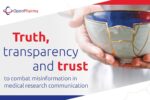This week, we signpost STM’s roadmap for implementing the UN’s 17 Sustainable Development Goals in academic publishing. We read about what meaningful accessibility means in academic publishing, and we explore insight into potential challenges and solutions for using AI in medicine. We also read about adoption rates of TOP guidelines by health psychology and behavioural medicine journals, and we highlight an upcoming webinar discussing results from UNESCO’s Global Consultation on diamond OA. Finally, we signpost the upcoming Open science: monitoring progress, assessing impact conference, which can be attended both in person and online.
To interact with:
A roadmap towards sustainable development in academic publishing via STM
The International Association of Scientific, Technical & Medical Publishers (STM) has produced a practical roadmap to help academic publishers work towards the UN’s 17 Sustainable Development Goals (SDGs). This guide outlines actionable steps for organizations across the sector at all stages of their sustainability journey, and it offers a toolkit of examples and resources. The roadmap aims to inspire and aid publishers in integrating the SDGs into their day-to-day practices, contributing to a more inclusive, equitable and sustainable future.
To read:
Meaningful accessibility in academic publishing via LSE Blogs | 7-minute read
Meaningful accessibility is a vital component of true inclusivity, extending beyond what open access alone can achieve. Specifically, it ensures that everyone can engage with research, regardless of disabilities, language barriers or limited resources. In this article, Akhilesh Ayer (Chief Executive Officer of Cactus Communications) discusses how accessibility should be viewed as an opportunity rather than a checkbox, and he also explores ways in which researchers, publishers and funders can promote truly inclusive practices.
Short-term benefits versus long-term reliability in medical AI via Nature | 12-minute read
AI machine learning models can enhance the healthcare sector by reducing subjectivity in diagnoses and helping to predict potential health risks. However, data contamination can undermine the accuracy of predictive models, especially over time, as clinical practices evolve or datasets are updated. In this article, Akhil Vaid (Assistant Professor at Icahn School of Medicine at Mount Sinai) highlights some of the challenges of using machine learning models in medicine and identifies potential solutions that researchers and physicians can implement.
Study on TOP guideline adoption via Health Psychology Review | 30-minute read
The Transparency and Openness Promotion (TOP) guidelines detail standards that journals can use to show that their published research is robust and verifiable. This cross-sectional study evaluated 19 health psychology and behavioural medicine journals using the Transparency of Research Underpinning Social Intervention Tiers (TRUST) journal policy tool to identify which TOP standards had been adopted. Read the full report to learn which standards were most frequently adopted and which were largely overlooked. The study also highlighted areas for improvement and acknowledged its strengths and limitations.
To engage with:
Results from UNESCO’s global consultation on OA via UNESCO
United Nations Educational, Scientific and Cultural Organization (UNESCO) is hosting a webinar to discuss its global consultation on diamond open access (OA). The consultation began in July 2024 as a community-led initiative based on the UNESCO Recommendation on Open Science principles, and it aims to identify priorities, challenges and opportunities in diamond OA. A global survey was launched in September 2024 in multiple languages to gather insights from across the diamond OA community. Register to join the free webinar on 3 July 2025 for an overview of the process and to discuss early findings and next steps.
Open science: monitoring progress, assessing impact conference via PathOS
The Open Science: Monitoring Progress, Assessing Impact international conference will be taking place on 7–8 July 2025 at the UNESCO headquarters in Paris and online. The conference is a gathering of policy makers, global experts and practitioners from the open science community. Topics will include PathOS’s findings on the impact of open science in academia, the principles of open science monitoring by the Open Science Monitoring Initiative, and the European Open Science Cloud Open Science Observatory platform. Registration is now open and free for both in-person and online participation.
Enjoy our content? Read last week’s digest and check out our latest quarterly update!
Don’t forget to follow us on Bluesky and LinkedIn for regular updates!


![[[A close-up view of a traditional printing press in operation, showing metal type and inked rollers in motion as printed material is prepared.]]](https://www.openpharma.blog/wp-content/uploads/2025/12/16Dec25-150x100.jpg)



